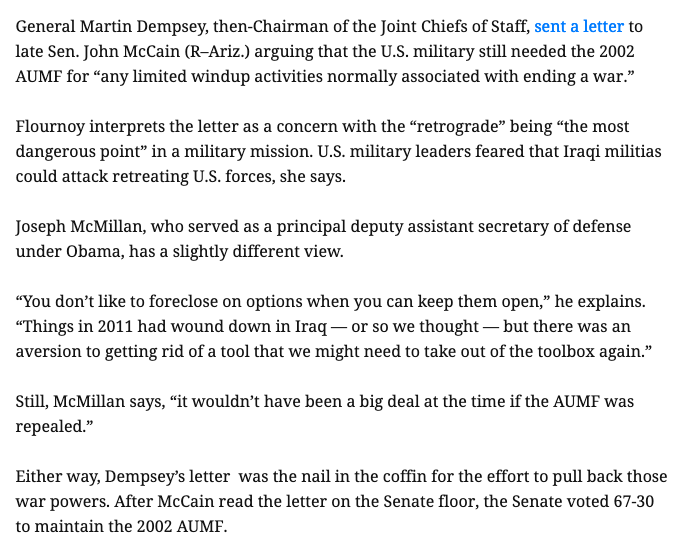This is SUCH an important article! Please give it a read but let me unpack why I'm so excited by this reporting.  https://twitter.com/RStatecraft/status/1359151867062849540
https://twitter.com/RStatecraft/status/1359151867062849540
 https://twitter.com/RStatecraft/status/1359151867062849540
https://twitter.com/RStatecraft/status/1359151867062849540
First and foremost, kudos to @benjaminja for creating a home like @RStatecraft for reporting like this from @matthew_petti. Without a home like this and @QuincyInst the natsec ecosystem would remain dangerously hawkish. 2/
As the article states, efforts to repeal the 2002 AUMF, the Iraq War authorization, go back to 2011 when @RandPaul and @SenGillibrand tried to repeal the war authorization as the final US troops were leaving Iraq. They were joined by others like @JeffMerkley and others. 3/
It should've been an easy, slam dunk, as I told @matthew_petti. The war was over, the final troops were leaving, and the repeal wouldn't go into effect until the last troops were fully out of Iraq as scheduled by the end of the year. 4/
But of course 2012 was going to be an election and Sen McCain, ever the champion of more war hoped that a Republican would win and reverse @BarackObama by sending troops back into Iraq. It's really that simple. It was a political play, divorced from a policy need. 5/
Yet on the eve of the repeal being included the NDAA, a funny thing happened. @Martin_Dempsey wrote to Sen McCain saying they should keep the AUMF on the books, essentially 'just in case.' But it's bs. The troops would have been gone by repeal. 6/
And even if they weren't no war authorization is needed to defend forces under attack. That's just now how the law works. But it's also not the point. The point was, according to one official from the time 'you don't like to foreclose on options when you can keep them open.' 7/
THIS is why this is all so important. Now, a decade later, Congress and @POTUS are going to consider all of this again and debate what kinds of war authorities to leave on the books. History has shown us that, left to their own devices, everyone will preserve 'flexibility.' 8/
Of course, as the piece goes on to show, that flexibility can and almost surely will be abused by future Administrations as in the case of Trump's lawless war making in Iraq. That's why we can't leave this all to autopilot. It's going to take pushing, action, and pressure. 9/
Two decades in, the status quo is a powerful, powerful force. The institutional desire to preserve 'flexibility' is overwhelming. But the whole point is that, when it comes to war, it is NEVER supposed to be like that. 10/
When it comes to war, it is supposed to be hard. It's supposed to require Congress to debate in public, for the public to weigh in, and for members of Congress to put their names next to the decision to send young people off to potentially die and to kill others. 11/
Without that, without a system in which hard choices are made, a world in which 'flexibility' is always preserved, the decision to use deadly force becomes divorced from the public and all too easy. That's how you get 2 decades of war. Changing that is how you #EndEndlessWar. 12/
When we allow Congress to avoid taking votes they think might end their career the consequences but are indifferent to the inaction that definitely ends lives, we have all failed. This year we're going to get a chance to fix that. Let's get it right this time. 13/13

 Read on Twitter
Read on Twitter


